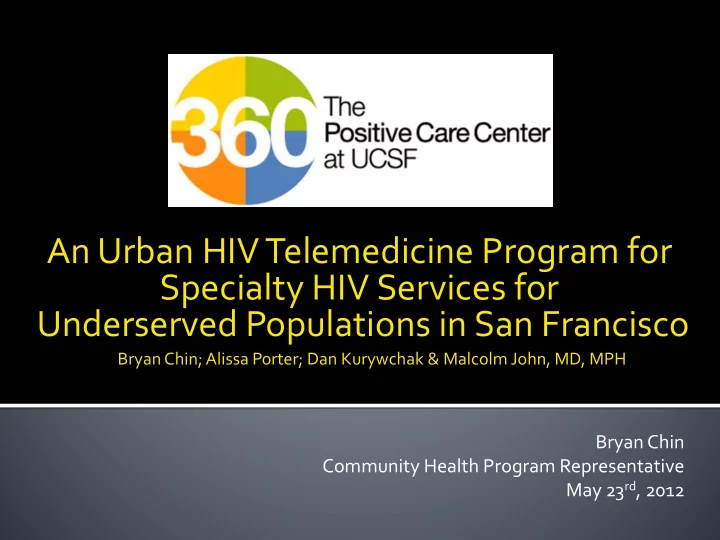

An Urban HIV Telemedicine Program for Specialty HIV Services for Underserved Populations in San Francisco Bryan Chin; Alissa Porter; Dan Kurywchak & Malcolm John, MD, MPH Bryan Chin Community Health Program Representative May 23 rd , 2012
The delivery of healthcare service using telecommunications technology Common use in rural and international settings At 360-UCSF: HIV health specialty services (nutrition, pharmacy, etc.) via real-time, secure broadband video connections in urban setting Launched September 2008, first urban model of its kind 180 patients have participated in both group and individual sessions – most with repeat visits Why Urban Telehealth? Public transportation limitations Patient challenges Resource allocation/sharing
750 patients served annually 68% Caucasian Services offered 18% African American Primary Care 7% Hispanic, 6% API Nutrition 75% Identify as MSM Pharmacy 60% private insurance, 40% Medicare/MediCal Psychiatry Case Management / Social Work Programs / Peer Advocacy Men of Color Program & Black Health Support Groups / Social Center of Excellence Activities ▪ Urban HIV Telehealth ▪ Shared Medical Appointments HIV & Aging
Maxine Hall Health Center South of Market Health Center 360: The Positive Care Center at UCSF Haight Ashbury Free Clinic Black Coalition on AIDS San Francisco AIDS Foundation
35 Physician-referred patient consultations during first year 23 nutrition and 12 pharmacy consults 31 men and 4 women 12 Drop-in Sessions 4 Group Telehealth Education Sessions 8-12 individuals per group
First-Year Patient Characteristics % HIV 100% Age ( Range 24-59 years ) Male 87% Female 13% AIDS 34% Hepatitis B/C 26% Substance Abuse History 43% MediCal/Medicare Insurance 43% Healthy SF (Low Income Insurance) 35% No Health Insurance identified 13% Baseline Labs CD4+ Count <200 9% CD4+ Count >200 91% HIV1 RNA <75 copies/mL 35% HIV 1 RNA >75 copies/mL 65% Median ( Range ) HIV1 log (N=15) 4.40 ( 1.63-5.70 ) CD4+ Count (N=23) 358.5 ( 59-635 )
Ethnicity of Individual Telehealth Patients Type of Telehealth Services Accessed White 18% 22% AA 2% Nutrition 3% 24% Asian 9% Pharmacy Latino/Hispa nic 6% Other 42% 74% Other Unknown
59% believed telehealth technology is 79% agreed or strongly agreed that confidential; 24% not sure of telehealth answered their health confidentiality and 17% disagreed that it questions adequately, while 17% were is confidential not sure and 5% strongly disagreed 18 25 16 20 14 12 15 10 8 10 6 4 5 2 0 0 Strongly Disagree Neutral Agree Strongly Strongly Disagree Neutral Agree Strongly Disagree Agree Disagree Agree
88% felt quality of visual image satisfactory to very satisfactory 98% reported audio quality as satisfactory to very satisfactory Overall, 90% of patients (30 of the 33 who chose to answer) preferred a telehealth consultation again rather than traveling to UCSF for consultations Which Modality Would You Prefer for Next Visit? Both 12% Travel to UCSF 9% Telemed 79%
Patient Characteristics: The first-year preliminary data indicated 1/3 of total users were uninsured, a population we cannot otherwise see at 360-UCSF. Services Utilized: Most patients felt that telehealth consultations with a pharmacist and nutritionist were helpful. Patient Satisfaction: Despite concerns about confidentiality, patients were overall very satisfied with their telehealth experience, believing that their consultation(s) adequately addressed their health questions, and preferred this modality of service rather than commuting for needed HIV subspecialty services.
Lessons learned Coordinators a.k.a. “Champions” needed at all sites Scheduling during site-specific HIV clinics or visits with primary provider (“One Stop Shopping”) ▪ Data from January 2012 – March 2012: ▪ Maxine Hall Health Center: 8 out of 23 appts actualized ▪ South of Market Health Center: 10 out of 13 appts actualized Anticipating drop-ins Anticipating technical issues Billing/Contract Future directions
Maxine Hall Health Center UCSF Catherine James, MD Malcolm John, MD, MPH Bruce Occena (SFDPH) Melody O’Donnell, RD, CDE Kristalia Williams Cristina Gruta, PharmD Jeff Jorgenson San Francisco AIDS Foundation David Kelegian Jeffery Leiphart, PhD Lawrence Lowery South of Market Health Center Marcos Hardman Arlene Gonzales, RN Cristina Sprague, FNP, WHCNP Black Coalition on AIDS Perry Lang Haight Ashbury Free Clinic Adrian Tyler
Malcolm John, M.D., MPH: Director malcolm.john@uscfmedctr.org Bryan Chin: Community Health Program Representative bryan.chin@ucsf.edu (415) 353-2282 Jeff Jorgenson: Deputy Director, Telehealth at UCSF JorgensonJ@medsch.ucsf.edu ******
Recommend
More recommend